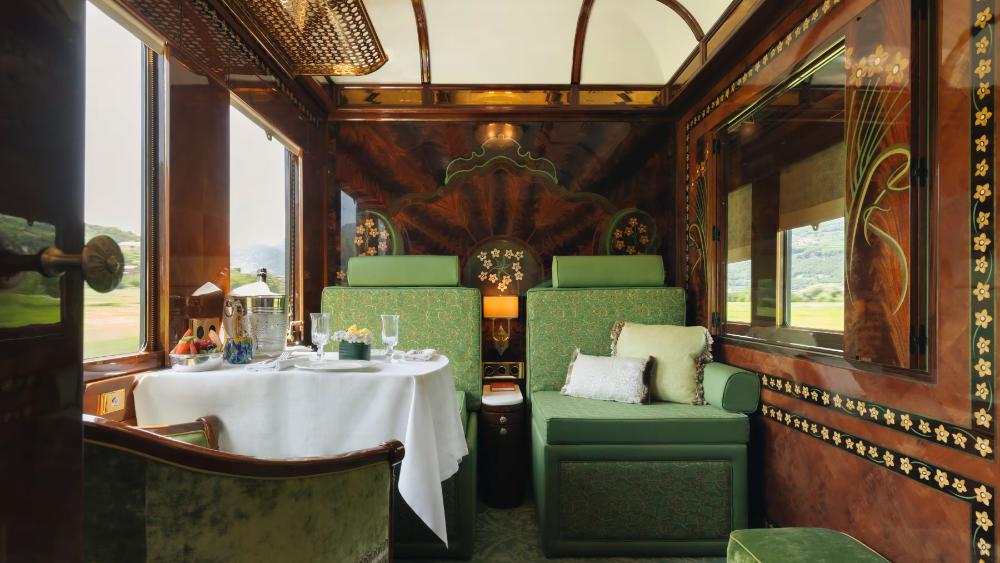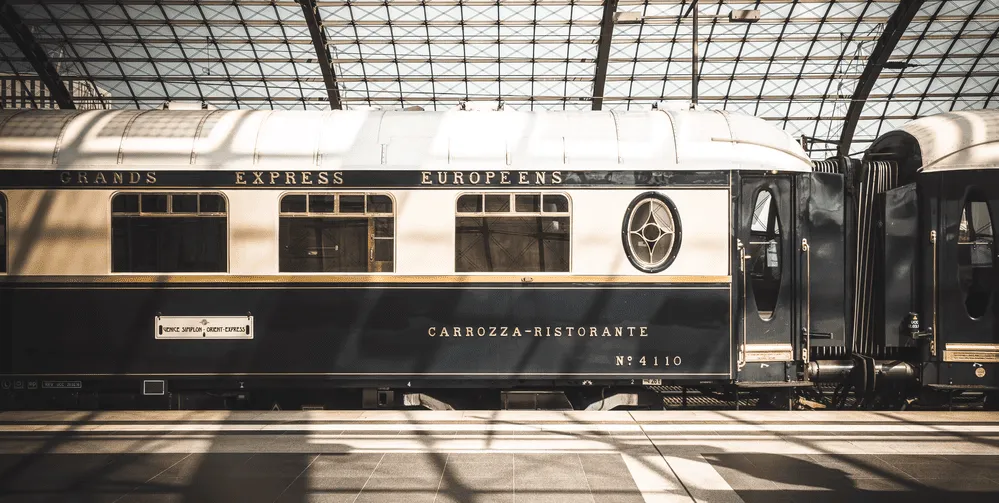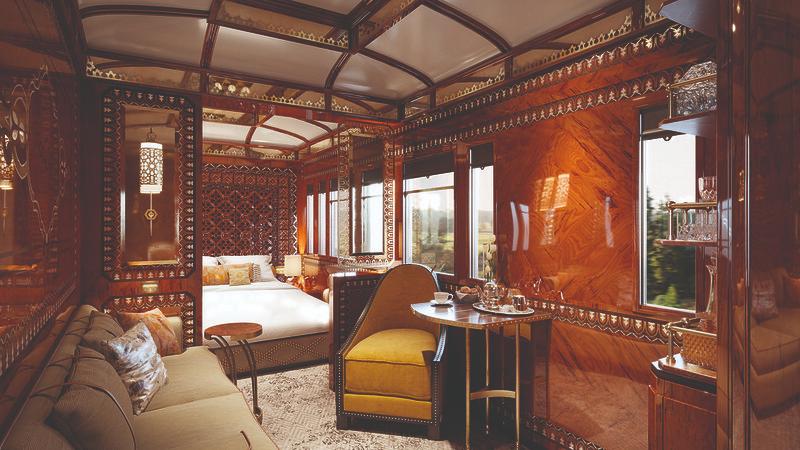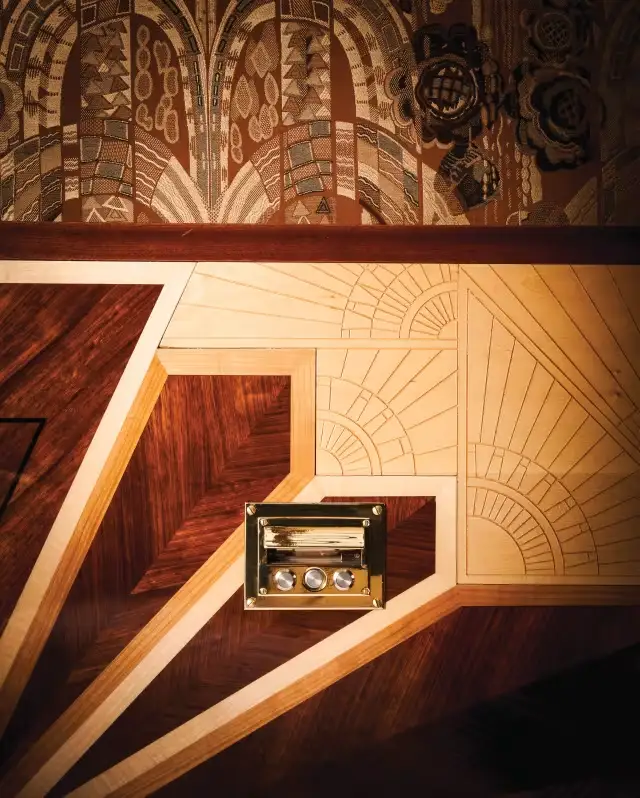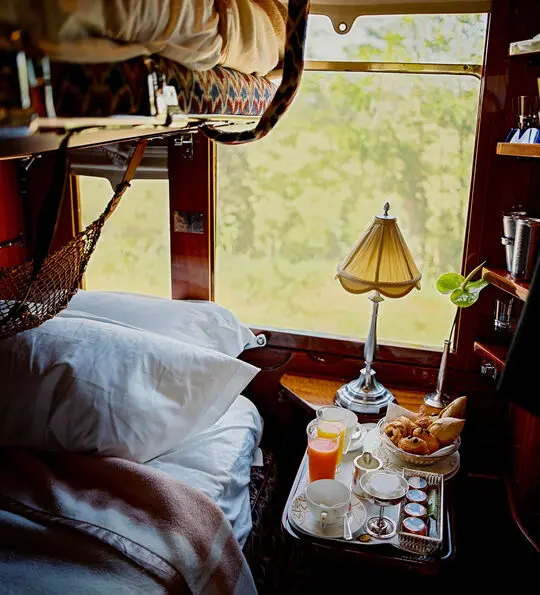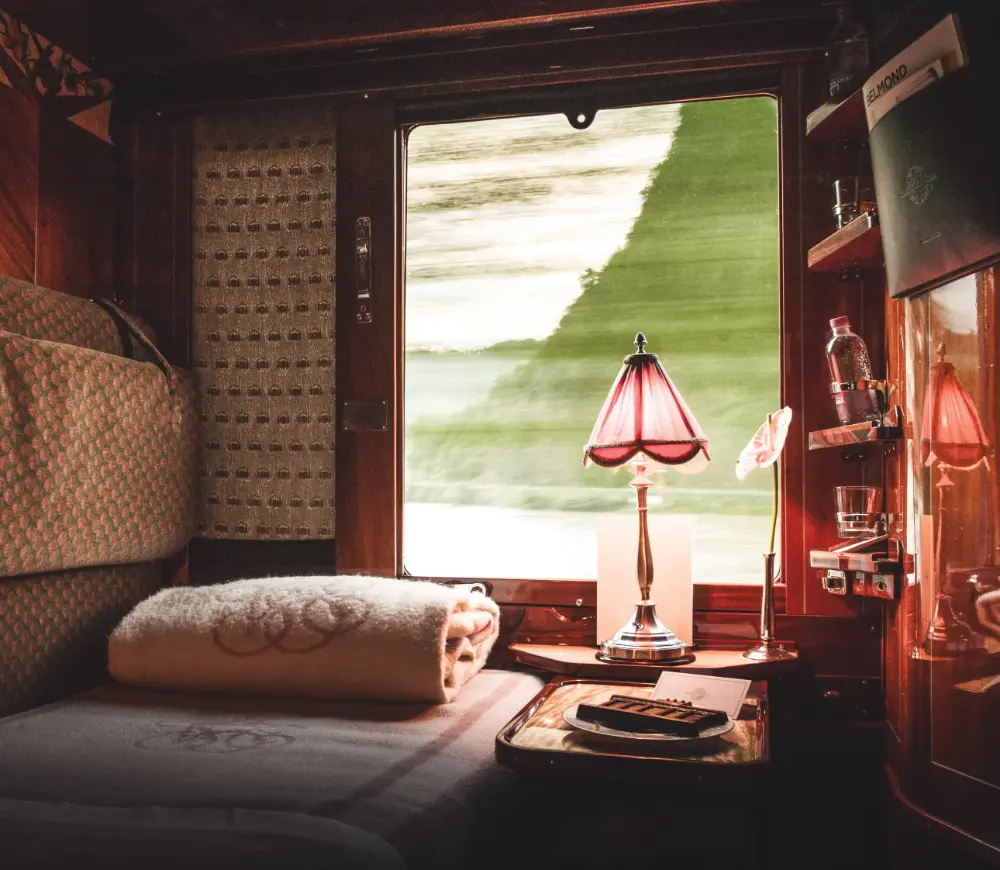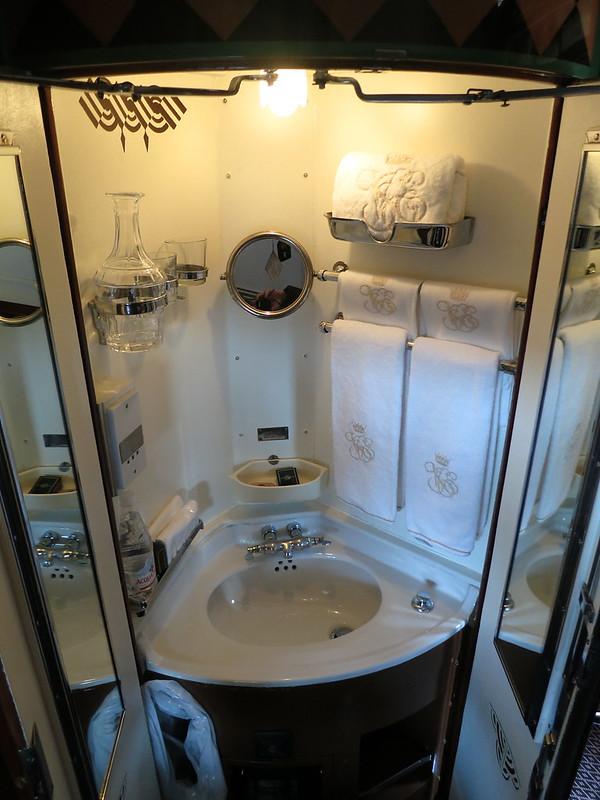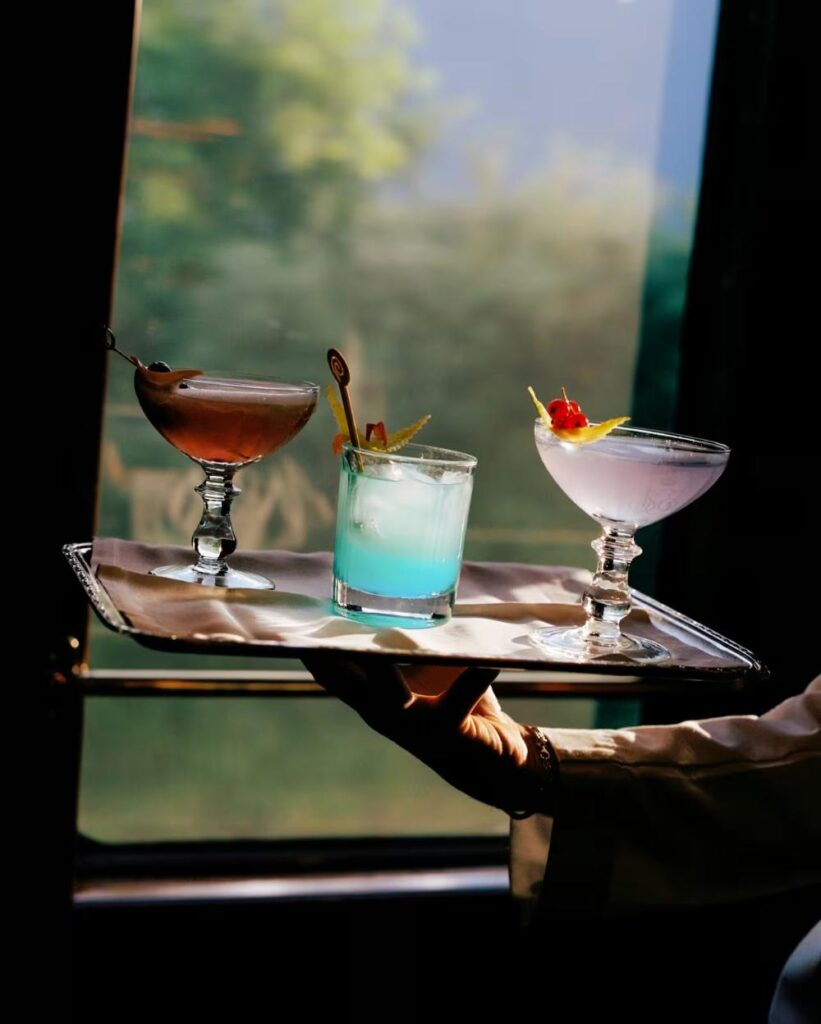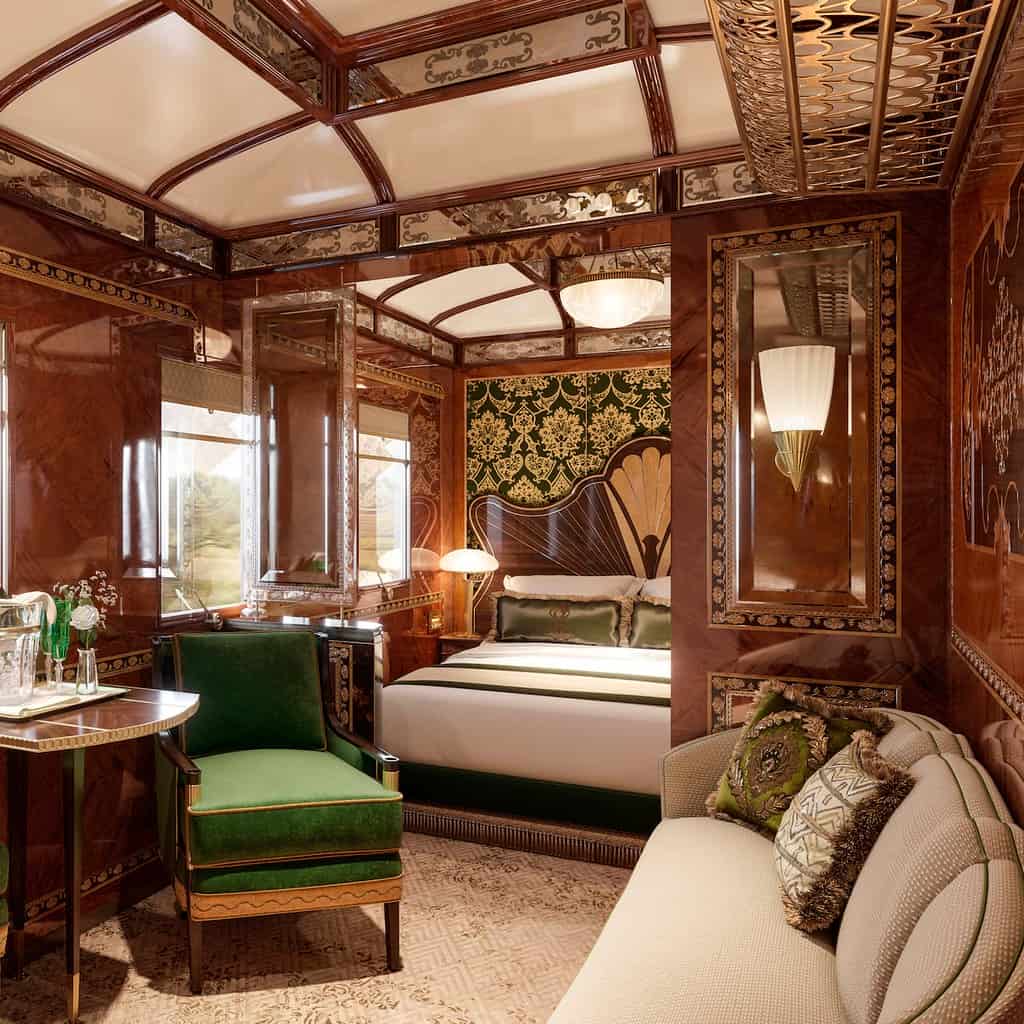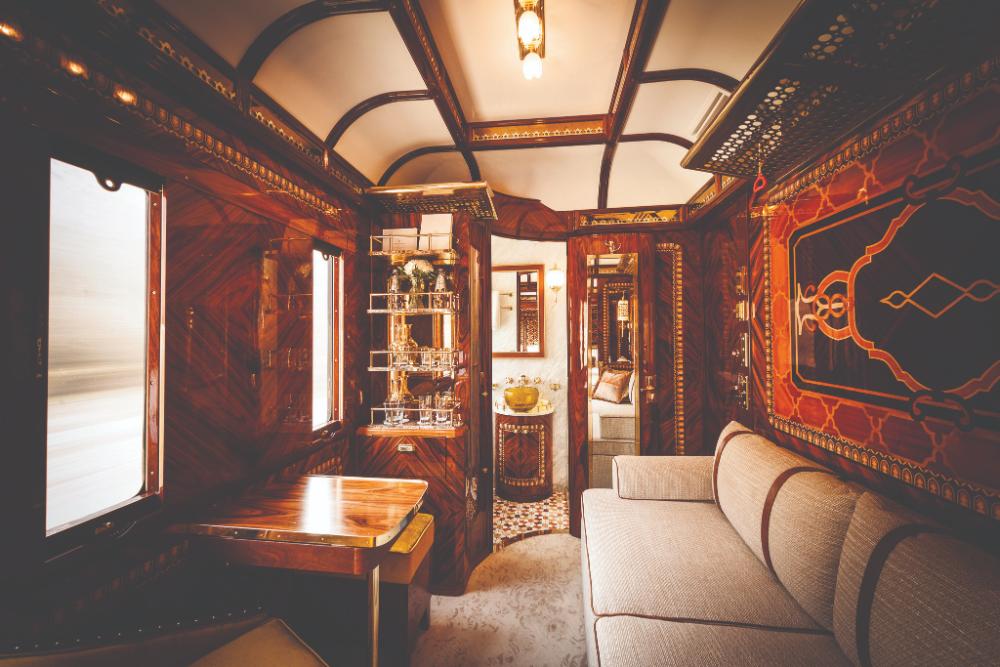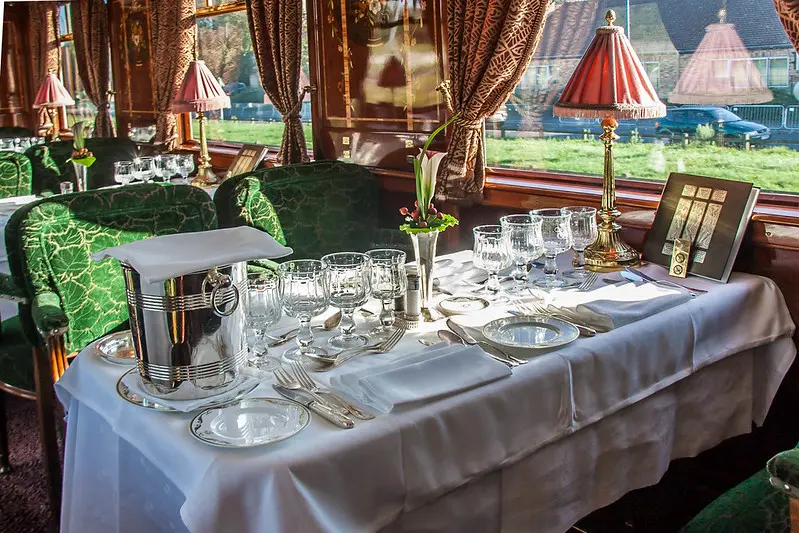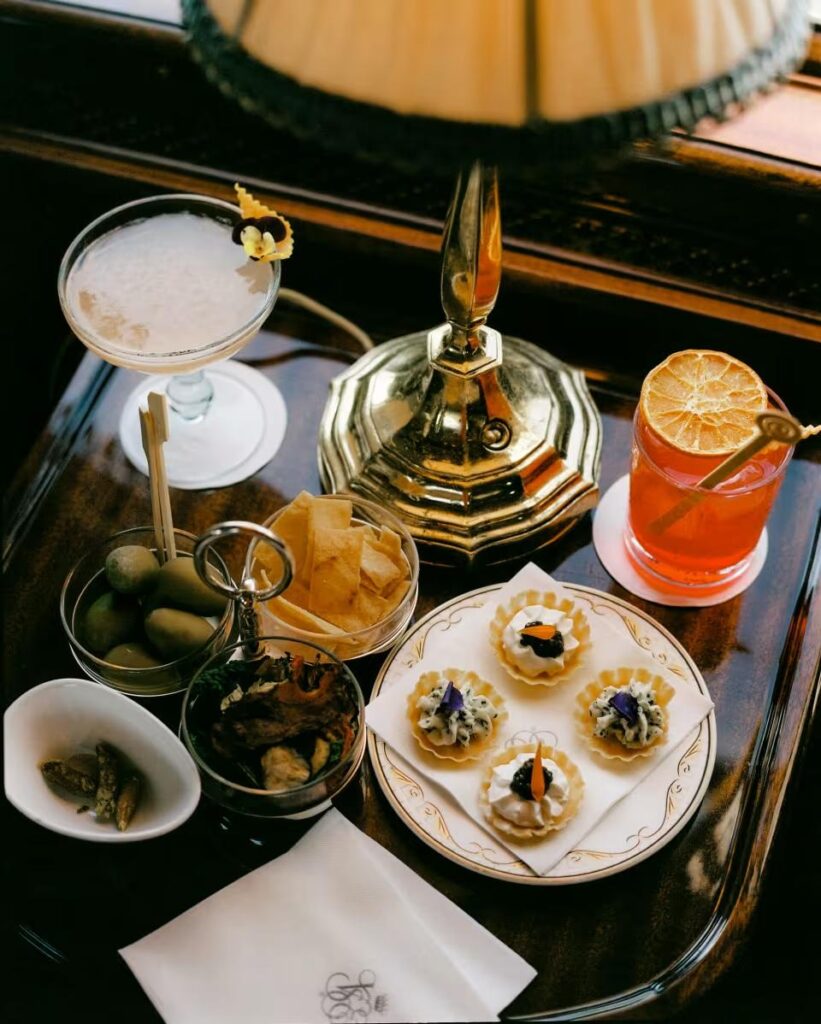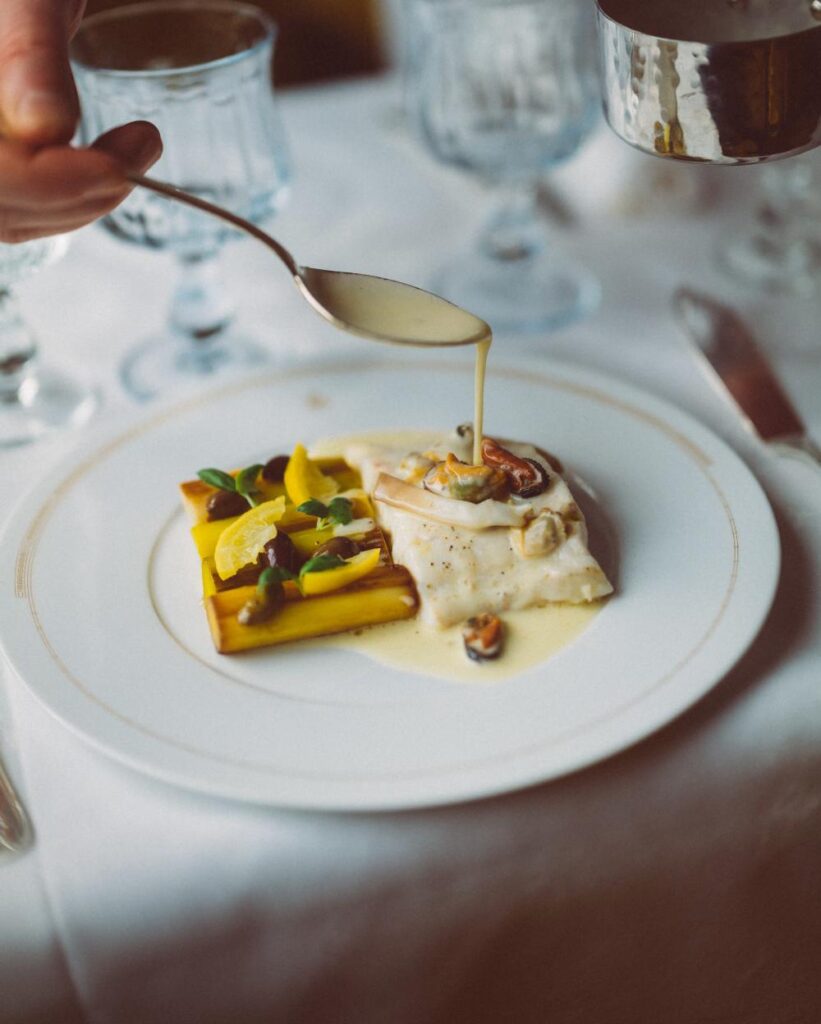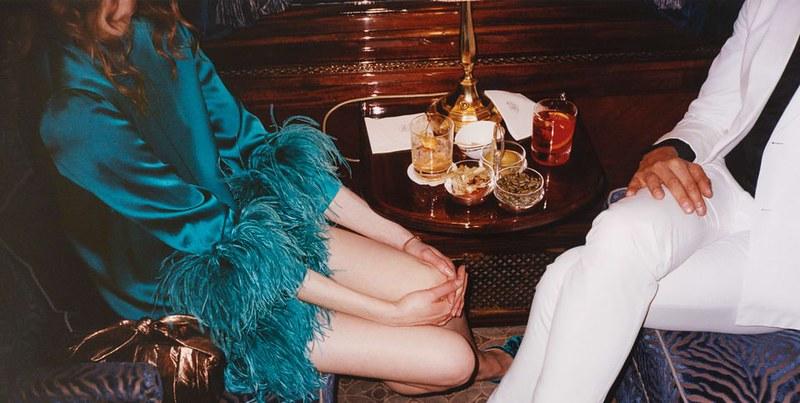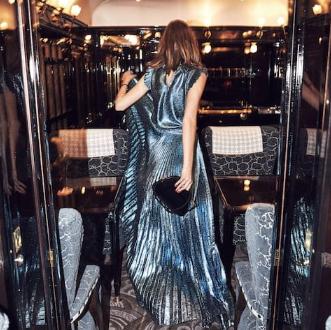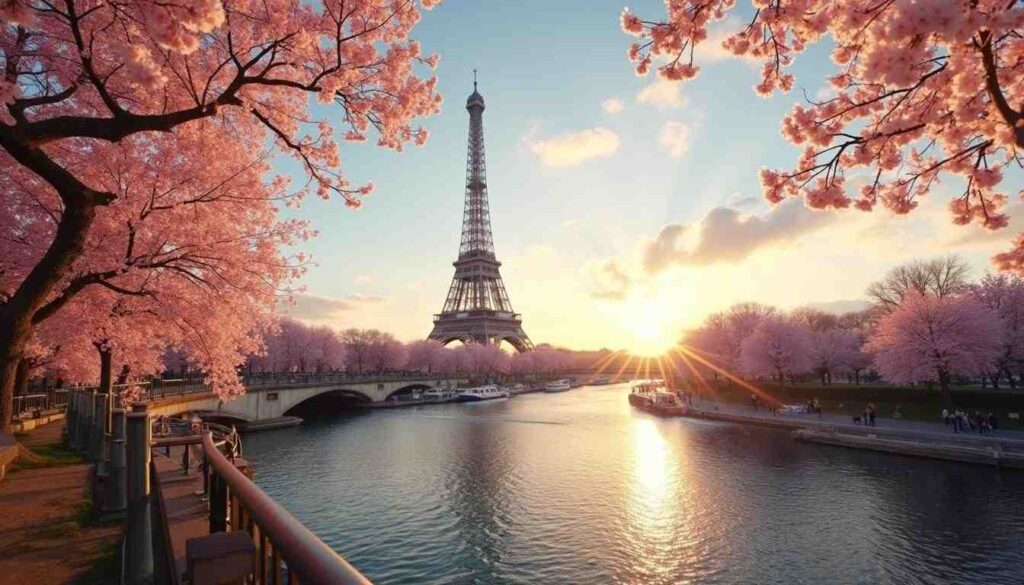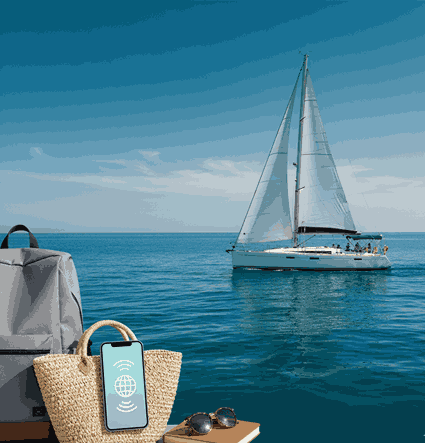- What Makes the Venice Simplon-Orient-Express Special
- VSOE Cabin Types and What to Expect
- Historic Pullman Cabins (the entry-level luxury)
- VSOE Cabin Suites (the sweet spot for most travelers)
- VSOE Grand Suites (when money is no object)
- VSOE Cabin Types & Accommodations Comparison
- The Dining Experience on VSOE Decoded
- Breakfast in your cabin vs. restaurant car
- Tip
- Lunch service and timing
- The famous VSOE 3-course dinner experience
- Dress codes and what they actually mean
- VSOE Routes and Tips for Timing Your Trip
- The budget Paris to Venice VSOE route
- Paris to Istanbul: the original Orient Express route
- The Real Cost Breakdown
- VSOE Trip Cost Calculator
- Planning Your VSOE Journey
- What to pack and what not to bring onboard VSOE
- VSOE Booking tips from someone who’s done it
- Read more
Picture this: You’re sipping champagne in a mahogany-paneled cabin while rolling through the Swiss Alps. The clickety-clack of the rails beneath you becomes time travel.
The Venice Simplon-Orient-Express isn’t your average train ride. It’s arguably the most famous luxury train in the world, and for good reason.
But here’s what most people don’t know: everything from the cabin you choose to the route you take dramatically changes your experience. After diving deep into reviews, official specifications, and insider tips, here’s everything you need to know before you book.
What Makes the Venice Simplon-Orient-Express Special
The original Orient Express launched in 1883, connecting Paris to Istanbul. It became the stuff of legend: think Agatha Christie’s “Murder on the Orient Express” and countless spy novels. European royalty, diplomats, and spies all used this route as their preferred way to travel across the continent.
But here’s the thing: the original line shut down in 1977. What we call the Venice Simplon-Orient-Express today is actually a lovingly restored collection of 1920s and 1930s carriages that Belmond (formerly Orient-Express Hotels) bought and renovated in the 1980s.
Most luxury trains focus on the destination. The VSOE is the destination. You’re getting from Point A to Point B while experiencing a rolling hotel where every detail screams old-world glamour.
The train operates at a maximum speed of just 87 mph—deliberately slow to let passengers savor the scenery. Modern high-speed trains could cover the same routes in half the time, but that’s missing the entire point.
“The Venice Simplon-Orient-Express represents the golden age of travel, when the journey was as important as the destination.” – Belmond
The restoration project took five years and cost over $16 million. Each carriage was stripped down to its frame, then rebuilt using original techniques and materials wherever possible.
| Feature | Regular European Train | Venice Simplon-Orient-Express |
|---|---|---|
| Speed | Up to 200+ mph | Max 87 mph (it’s about the journey) |
| Dining | Snack bar | 3-course gourmet meals |
| Cabins | Basic seats/bunks | Handcrafted wood & brass fittings |
| Dress Code | Casual | Formal evening wear required |
| Price | €50-200 | $5,000-15,000+ |
Each carriage has its own story. Car 3425 once carried maharajas across India. Car 3473 transported European aristocrats to the French Riviera. Car 3309 was used by the French government for state visits.
Belmond spent millions restoring these carriages to their original Art Deco glory. Master craftsmen recreated the marquetry work by hand.
Original Lalique glass panels were painstakingly restored. Even the brass fittings were re-machined to 1920s specifications.
The attention to detail borders on obsessive. When restorers couldn’t find original fabric patterns, they commissioned textile mills to recreate them from archived samples. Door handles, window latches, and even the coat hooks are authentic period pieces or exact reproductions.
VSOE Cabin Types and What to Expect
Let’s talk about where you’ll actually sleep, because cabin choice makes or breaks your VSOE experience. The difference between cabin categories goes far beyond just size, it affects everything from your dining times to bathroom access.
Historic Pullman Cabins (the entry-level luxury)
Don’t let “entry-level” fool you. These cabins are still more luxurious than most hotel rooms, but they require some mental preparation.
- Size: About 75 square feet (think a small New York studio bathroom)
- Layout: Upper and lower berths that convert from day seating
- Amenities: Private washbasin, original 1920s fittings, Egyptian cotton linens
- Reality check: You’ll be cozy. Very cozy.
The day setup gives you a comfortable sofa facing the window. Around 9 PM, your steward will politely ask you to step out for 10 minutes while they convert your cabin.
When you return, you’ll find bunk beds with crisp white linens and a small ladder to the upper berth. Pack light shoes for those midnight bathroom trips.
VSOE Historic Cabins Storage
You get one small wardrobe, under-seat storage, and overhead netting. That’s it. Pack like you’re going on a weekend city break, not a week-long vacation.
VSOE Historic Cabins Bathroom
No private bathroom. You’ll share facilities at the end of each carriage. They’re clean and well-maintained, but midnight trips require putting on a robe and walking down the corridor.
VSOE Cabin Suites (the sweet spot for most travelers)
This is where most first-timers should aim. You get significantly more space without the jaw-dropping price of a Grand Suite.
- Size: About 118 square feet
- Layout: Fixed double bed, separate seating area
- Perks: Private bathroom with shower, more storage space
- Best for: Couples who want romance without cramping
The bathroom situation alone makes these worth the upgrade. Having your own shower on a moving train feels surprisingly luxurious.
The bathroom includes a toilet, sink, and shower stall. Water pressure varies depending on the train’s speed and location, but it’s perfectly functional.
Instead of convertible furniture, you get a proper double bed that stays a bed. The seating area has two comfortable chairs facing the window, plus a small table for room service or card games.
VSOE Cabin Suite Storage
Double the wardrobe space of Historic cabins, plus under-bed storage and a separate luggage rack. You can actually unpack and settle in.
Suite guests get priority seating times for meals and can request room service for breakfast and light snacks.
VSOE Grand Suites (when money is no object)
Two options here, both spectacular and spectacularly expensive. These aren’t just bigger cabins, they’re entirely different experiences.
Venice Grand Suite
You get a separate living area with a sofa, armchairs, and coffee table. The bedroom is in a separate compartment with a king-sized bed and full-length wardrobe.
- Size: Nearly 200 square feet
- Features: King bed, marble bathroom, living area, personal steward
- Price: Around $15,000+ per person
- Special touch: Champagne service whenever you want it
Marble fittings, heated floors, and a bathtub. Yes, a full bathtub on a train. The water comes from onboard tanks, so you’re not bathing in canal water.
Your dedicated steward handles everything from unpacking your luggage to arranging special dietary requests. They’re available 24/7 and know your preferences after the first day.
Istanbul Grand Suite
The Istanbul suite features hand-painted Turkish tiles, Persian rugs, and brass fixtures inspired by Ottoman design. Even the bathroom amenities are sourced from Turkish luxury brands.
- Size: Similar to Venice
- Unique feature: Turkish-inspired décor
- Availability: Only on Paris-Istanbul routes
You can only book this suite on the few annual Paris-Istanbul journeys, making it the most exclusive accommodation on any Belmond train.
The Grand Suites feel more like luxury hotel rooms that happen to be on rails. You’ll have space to actually move around, which is saying something on a train. But here’s the reality: you’re paying hotel suite prices for train suite space.
The Dining Experience on VSOE Decoded
Food on the VSOE goes beyond sustenance. But let’s break down what actually happens, because the dining experience varies dramatically depending on your cabin type and route.
Breakfast in your cabin vs. restaurant car
Your steward brings continental breakfast to your cabin around 8 AM. The presentation is Instagram-worthy: everything served on bone china with silver cutlery. You’ll get fresh croissants (often still warm), seasonal fruit, artisanal jams, and excellent coffee or tea.
Tip
Cabin breakfast happens whether you want it or not. If you’re a late sleeper, discuss timing with your steward the night before.
If you’re in a cabin suite or above, you can also head to the restaurant car for a full breakfast. The menu includes eggs Benedict, smoked salmon, French toast, and usually one hot entrée that changes based on local ingredients picked up at overnight stops.
Lunch service and timing
Lunch happens in the restaurant car and it’s mandatory seating, meaning you get assigned a specific time slot. Usually around 12:30 PM or 1:30 PM.
The head chef sources ingredients locally at each major stop. If the train stops in Lyon, expect French regional specialties. Passing through Austria? Schnitzel and local wines appear on the menu.
Sample lunch progression on VSOE
- Appetizer: Seasonal soup or salad (like butternut squash soup with truffle oil in autumn)
- Main course: Regional specialties (coq au vin through France, osso buco in Italy)
- Dessert: Usually French pastry or regional sweets
- Wine pairings: European wines selected to complement both the food and the scenery
Lunch is more casual than dinner but still formal by normal standards. Expect white-glove service, multiple courses, and leisurely pacing.
The famous VSOE 3-course dinner experience
This is the main event and the reason many people book the VSOE in the first place. Dinner starts around 8 PM and can last 2 hours or more. You’ll be assigned one based on your cabin type. Grand Suites get first choice, obviously, Cabin Suites get second priority, Historic cabins fill remaining slots.
The pre-dinner ritual:
- 6:30 PM: Champagne reception in the bar car while the sun sets
- 7:30 PM: Migration to the restaurant car as stewards announce seating
- 8:00 PM: Dinner service officially begins
VSOE Sample dinner progression
The sommelier personally explains each pairing and will adjust selections based on your preferences. The wine list focuses on regions along the route.
- Amuse-bouche: Chef’s creative small bite
- Starter: Lobster bisque with cognac cream or duck foie gras terrine
- Fish course: Pan-seared John Dory with saffron sauce (on Mediterranean routes)
- Meat course: Beef tenderloin with seasonal vegetables or rack of lamb with herbs de Provence
- Cheese course: Selection from regions the train passes through
- Dessert: Dark chocolate soufflé or seasonal fruit tart
- Petit fours: Small sweets with coffee
Dress codes and what they actually mean
The VSOE takes dress codes seriously, and you’ll see other passengers sent back to change if they’re underdressed.
Daytime dress code
Smart casual. Think “upscale brunch” not “yoga pants.” For women, this means nice pants or skirts with blouses, sweaters, or blazers. Men should wear collared shirts, dress pants, and closed-toe shoes.
Evening dress code
Formal. This means cocktail attire or evening wear. For women, cocktail dresses, elegant separates, or dressy pantsuits work. Men need suits or tuxedos. Ties are required.
The maître d’ will politely but firmly ask underdressed passengers to return to their cabins to change. There are no exceptions, regardless of cabin category.
The train provides laundry service, but it’s expensive. European passengers tend to dress more formally than Americans expect. When in doubt, overdress rather than underdress.
VSOE Routes and Tips for Timing Your Trip
The VSOE offers several routes throughout the year, but understanding the differences helps you choose the right journey for your goals and budget.
The budget Paris to Venice VSOE route
This is currently the most popular route and runs March through November with multiple departures per month. It’s become the go-to choice for many travelers due to better pricing and direct access from Paris.
Detailed itinerary Paris to Venice VSOE Itinerary:
- 3:00 PM: Depart Paris Gare de l’Est station
- 4:00 PM: Welcome champagne service begins as you settle into your cabin
- 8:00 PM: Formal dinner service begins as you cross into Switzerland
- Evening: Continue through Swiss mountain passes with spectacular alpine views
- Overnight: Sleep while crossing the Swiss Alps and into northern Italy
- 8:00 AM next day: Continental breakfast service, wake up in northern Italy
- 5:00 PM: Arrive Venice Santa Lucia station
The route through the Swiss Alps is perfectly timed so you’re awake for the most dramatic mountain scenery. You’ll pass through the Bernese Oberland, see snow-capped peaks, and cross multiple Alpine passes before descending into the Italian lake region.
It’s the best option for the first-time riders who want the full experience without multiple nights aboard, and travelers seeking better value than UK routes
March-May and September-November offer the best combination of weather and pricing. July-August books up fastest and costs 30-40% more. Paris departure also means easier connections from major European cities.
Paris to Istanbul: the original Orient Express route
This is the legendary route, the one that inspired novels and movies. It only runs a few times per year, making it the most exclusive VSOE experience.
You’re literally following the path of the original 1883 Orient Express. The route passes through 8 countries and crosses several time zones.
Complete Paris to Istanbul VSOE itinerary
- Day 1: Depart Paris in the afternoon
- Night 1: Sleep while crossing Germany and Austria
- Day 2: Wake up in Hungary, explore Budapest during a 3-hour stop
- Night 2: Continue through Romania
- Day 3: Arrive in Istanbul in the evening
The train makes several extended stops where you can explore cities like Vienna, Budapest, and Bucharest with guided tours.
This route books up fastest because it’s the most historically authentic.
The VSOE adds special routes throughout the year: Christmas markets (November-December), Venice Carnival (February), summer routes to places like Prague or Krakow.
| Route | Travel Time | Nights on Board | Best Season | Approximate Cost |
|---|---|---|---|---|
| Paris-Venice | 24 hours | 1 night | April-October | $5,100-15,000+ |
| Paris-Istanbul | 50 hours | 2 nights | April-November | $8,000-25,000+ |
| London-Paris | 12 hours | Day trip only | Year-round | $2,500-5,000+ |
| Christmas markets | 3-4 days | 2-3 nights | November-December | $7,000-20,000+ |
| Venice Carnival | 30 hours | 1 night | February | $6,000-18,000+ |
The Real Cost Breakdown
Let’s talk money. VSOE pricing can be shocking if you’re not prepared, but understanding what’s included and what costs extra helps you budget accurately.
Good news first: your ticket includes almost everything for the luxury experience.
Amenities included into VSOE ticket price
- All meals (continental breakfast, lunch, three-course dinner)
- House wines, beer, and soft drinks during meals
- Welcome champagne service
- All cabin service and nightly turndown
- Live entertainment (piano music, sometimes dancing)
- Afternoon tea service
- Use of all public areas (bar car, restaurant car, observation car)
Things that cost extra include drinks outside meal times ($15-25 per cocktail), Spa treatments (available on some routes), gratuities for stewards (expect $50-100 per person), getting to/from train stations in style (taxis from Venice station to city center run about €40).
Shoulder season (March, November) offers the best prices. You’ll save 20-30% compared to peak summer rates.
“I paid full price for July and it was worth every penny, but if I did it again, I’d book April or October and use the savings for a Grand Suite upgrade.” – TripAdvisor reviewer, verified purchase
Very rare, but occasionally cabins become available 2-4 weeks before departure due to cancellations. These are usually at full price but might be your only option for popular routes. Belmond offers discounts for groups of 8+ people, but you’ll need to book well in advance to get cabins near each other.
Planning Your VSOE Journey
April and May are the most optimal due to perfect weather, smaller crowds, and decent pricing. Summer months are the peak season, they are the most expensive, but guarantee good weather.
September and October are the best overall value and stunning fall colors through the Alps. November through March: limited routes, but cheapest prices and holiday-themed journeys
What to pack and what not to bring onboard VSOE
Pack at least 1 piece of formal attire, avoid bringing large suitcases. Hair dryers are not available in Historic cabins, casual evening wear will be of no use.
VSOE Booking tips from someone who’s done it
Book 6-12 months ahead for popular routes like London-Venice. The best cabins sell out first.
Consider cabin location: Middle of the train = smoothest ride. Avoid cabins directly over the wheels if possible.
Travel insurance is worth it: These trips are expensive and weather can cause delays.
The Venice Simplon-Orient-Express costs more than practical transportation, moves slower than modern trains, and demands formal wear. But it’s an experience that’ll give you stories for life. Sometimes the journey really is more important than the destination.
How much does it cost to ride the Venice Simplon-Orient-Express?
Fares start around €3,500 per person in a Historic Cabin. Suites and Grand Suites range from €7,000 to €10,000+.
What is included in VSOE ticket price?
Accommodation, multi-course dining, breakfast in your cabin, afternoon tea, and steward service. Drinks and excursions are extra.
What are the different VSOE cabin types?
Historic Cabins (bunks), Suites (double bed, en-suite), Grand Suites (bedroom, lounge, bathroom).
What routes does the Venice Simplon-Orient-Express take?
Mainly London–Paris–Venice, plus seasonal trips to Istanbul, Vienna, Budapest, Prague, and more
Is the Venice Simplon-Orient-Express worth the money?
Yes if you value luxury rail travel and history; no if you want simple transport value.
Can you take a day trip on the Orient Express?
Yes. The British Pullman offers London-based day trips with dining in vintage carriages.
How far in advance should you book?
6–12 months for popular routes and Grand Suites; shorter trips may sell out closer to departure.
Read more
Orient Express Yacht Corinthian & Olympian: Prices, 2026 Sailings & Largest Sailing Yacht Facts
Orient Express 2025–26: Routes & Prices, Venice Simplon vs. La Dolce Vita & New Nostalgie Train
Orient Express Original Route Map & History (1883–Today)
12 Epic Train Journeys across Europe: 4 of them are Launching in 2025

